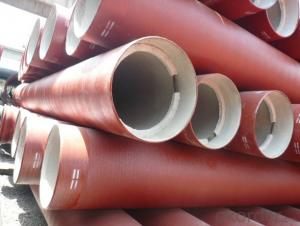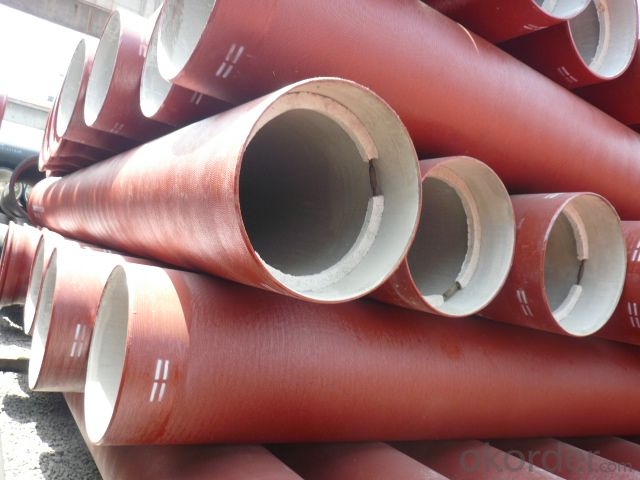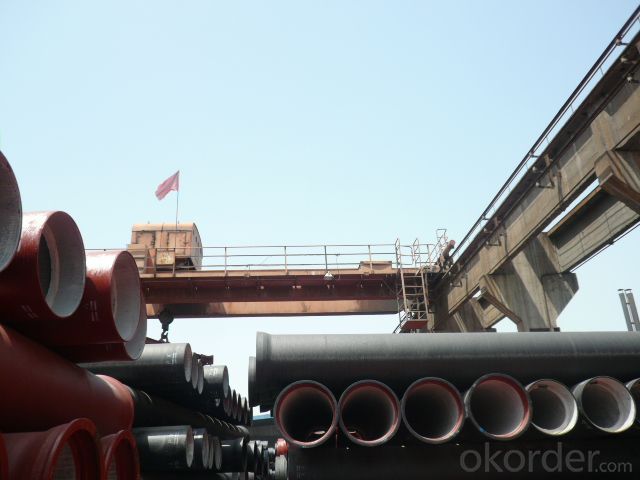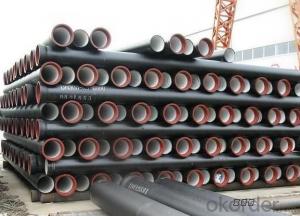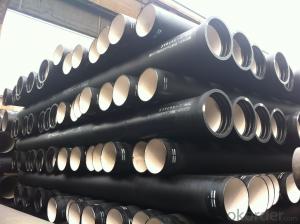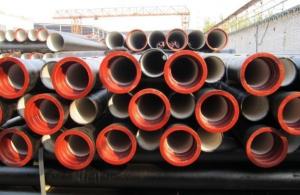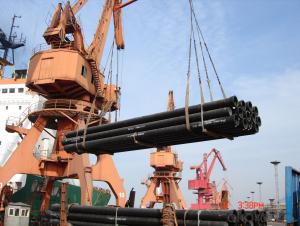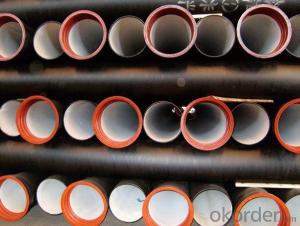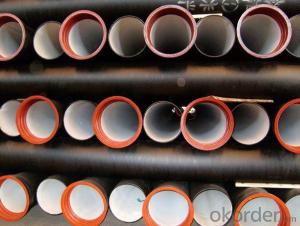Ductile Iron Pipe DN400 EN545/EN598/ISO2531 C30
- Loading Port:
- China main port
- Payment Terms:
- TT or LC
- Min Order Qty:
- 20 m.t.
- Supply Capability:
- 200000 m.t./month
OKorder Service Pledge
OKorder Financial Service
You Might Also Like
1,Ductile Iron Pipe Description :
DI pipe fittings are manufactured according to ISO 2531 or BS EN545 or BS4772 FOR POTABLE WATER ,internal is cement lining or wet epoxy coating;External is zinc plus bitumen or wet epoxy coating. We also manufacture ductile iron fittings with fusion bonded epoxy both inside and outside. All the producets are sutible to water pipes fields.We have passed ISO9001,ISO14001,OHSMS18001 certificate.Pipes confirm to ISO2531,K9 class,T type joint,6m long,with inside cements lining conform to ISO4179, outside Zinc
spraying(130g/m2) and bitumen coating(70μm) conform to ISO8179.Pipe ends: Spigot and socket ends, with 100% SBR rubber gaskets accoding to ISO4633
2,Main Features of the Ductile Iron Pipe:
1).Quality guarantee
• Chemical checking
• NDE after rough machining
• Mechanical testing after heat treatment
• Final NDE,dimension inspected
2).Quality document
• Full Q.A document as per client request
3).Packing and Shipping
• standard export package(carton/wooden case/pallet)
• accept FOB,FAS,CNF,CIF door to door etc or customer designated shipping agent
4).Service
• Drawing: we can translate your original drawing, offer best suggestion on design
• Quality: we have full set quality control system to guarantee the best quality.
• Inspection: inspect in house, all our products must be checked 3 times before packing
3,Ductile Iron Pipe Images:
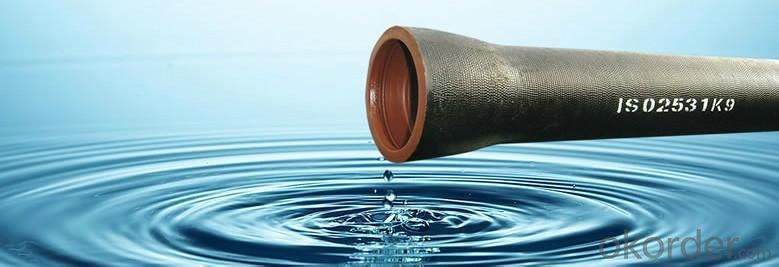
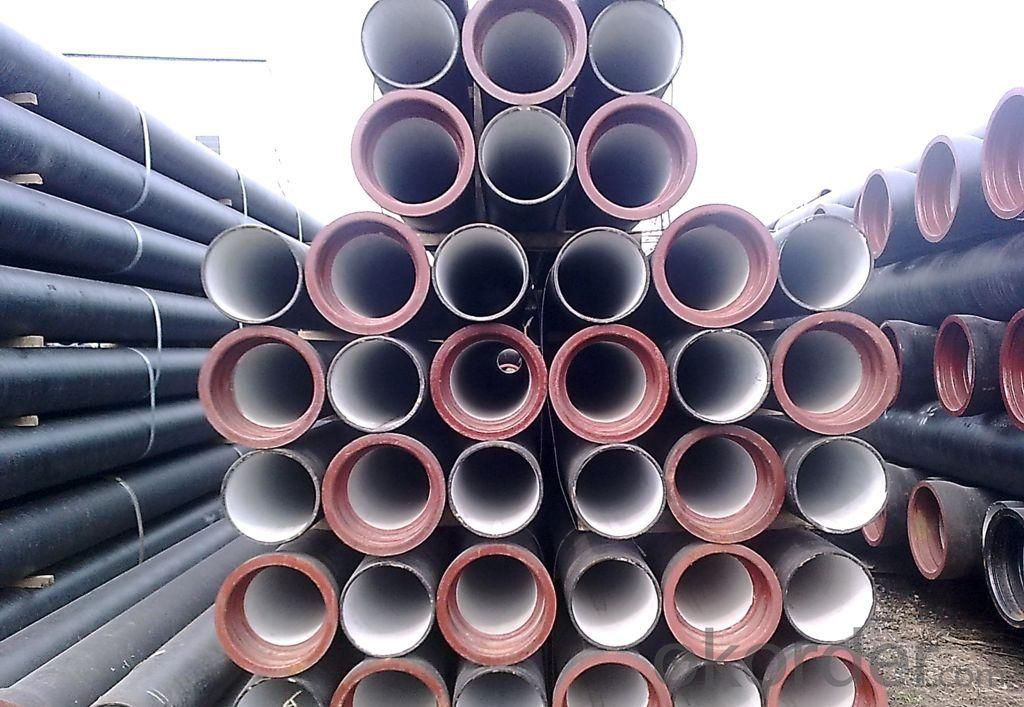
4. Ductile Iron Pipe Specification:
Surface Finishes: Bare, Oiled, Mill Varnish, Galv,FBE, FBE Dual, 3LPE, 3LPP, Coal Tar,Concrete Coating and Tape Wrap
End Finishes: Beveled, Square Cut, Threaded, hat
Additional Services: Internal Coating
Packaging: packed in bag, plastic bag, steel strip, steel wire,double wire, iron box, wooden box, tarpaulin, plastic sheeting
Inspection: MOODY SGS BV GL DNV ABS LIOYD’S
Test: X-ray, UT, magnetic particle,inspection,hydrostatic test.
Documentary: MTC, material certification,Origin certification, CI or PI,Test Report, export licence, handling order, B/L,insurance policy,shipping instructions, contract, packing list etc.
5.FAQ:
We have organized several common questions for our clients,may help you sincerely:
1.Q: Why would you choose ductile iron pipe rather than other pipe materials?
A:The reasons are obvious for that not only ductile iron pipe possesses the inherent strength and flexibility of ductile iron, combined with proven corrosion protection systems, but also the cost savings can be achieved from design to installation and commissioning.
2.Q:Why can you guarantee the inner of pipes can’t be corroded?
A: High alumina cement mortar lining and sulphate-resistant cement mortar lining. These two special linings are applicable to inner anti-corrosion for sewage pipes, improving resistance to erosion of the sewage components.
- Q: Can ductile iron pipe be used for bridge crossings?
- Yes, ductile iron pipe can be used for bridge crossings.
- Q: Are ductile iron pipes suitable for fire protection systems?
- Yes, ductile iron pipes are suitable for fire protection systems. Ductile iron is a strong and durable material that can withstand high pressure and temperature fluctuations, making it ideal for fire protection systems that require reliable and long-lasting pipes. Additionally, ductile iron has excellent corrosion resistance, which helps to prevent the degradation of the pipes over time, ensuring the integrity of the fire protection system. The high tensile strength of ductile iron also provides added safety benefits as it can withstand the stress and strain that may occur during a fire event. Therefore, ductile iron pipes are a suitable and commonly used material for fire protection systems in various applications, including commercial buildings, industrial facilities, and residential areas.
- Q: The difference between HDPE pipe and ductile iron pipe
- Of different uses, ductile iron pipes are widely used for municipal water supply and drainage, rural drinking water and outdoor fire fighting works; mechanism cast iron pipes are mainly used in the city.
- Q: Can ductile iron pipe be used for industrial process piping?
- Indeed, industrial process piping can make use of ductile iron pipe. Renowned for its robustness, longevity, and ability to withstand corrosion, ductile iron pipe proves itself as an appropriate selection for diverse industrial functions. It boasts the capability to manage high-pressure systems and commonly finds application in sectors like water and wastewater treatment, oil and gas, chemical processing, and power generation. Moreover, ductile iron pipe offers ease of installation and an extensive lifespan, thus rendering it a cost-efficient choice for industrial process piping.
- Q: Can ductile iron pipes be used for underground compressed air systems?
- Yes, ductile iron pipes can be used for underground compressed air systems. Ductile iron pipes have high strength and durability, making them suitable for various applications including underground installations. They are corrosion-resistant, which is essential for underground systems where moisture and other environmental factors can cause damage over time. Additionally, ductile iron pipes have the ability to withstand high pressure, making them a reliable choice for compressed air systems. However, it is important to ensure that the pipes are properly installed, with proper support and protection to prevent damage or leaks. Regular maintenance and inspection should also be conducted to ensure the longevity and efficiency of the underground compressed air system.
- Q: Are ductile iron pipes suitable for use in mining tailings pipelines?
- Mining tailings pipelines can utilize ductile iron pipes due to their suitability for this purpose. These pipes possess remarkable strength and durability, enabling them to endure the harsh and abrasive conditions often encountered in mining operations. With their high tensile strength, they can effectively handle the pressure and weight of the tailings material. Furthermore, their resistance to corrosion is crucial in mining environments where the tailings may contain corrosive chemicals or substances. Moreover, ductile iron pipes are known for their ease of installation and maintenance, providing a valuable advantage in time-sensitive mining operations. Ultimately, ductile iron pipes offer a dependable and cost-effective solution for mining tailings pipelines.
- Q: What are some common applications for ductile iron pipe?
- Ductile iron pipe, also known as DI pipe, is widely used in various applications due to its durability, strength, and corrosion resistance. Here are some common applications for ductile iron pipe: 1. Water Distribution: Ductile iron pipe is extensively used for the distribution of potable water. Its high tensile strength allows it to withstand high water pressure, making it ideal for water mains, water transmission lines, and water distribution networks. 2. Sewer Systems: Ductile iron pipe is commonly used in sewer systems due to its resistance to corrosion and its ability to handle high loads. It is often used for gravity sewer lines, force mains, and stormwater systems. 3. Industrial Applications: Ductile iron pipe finds applications in various industrial settings, including power plants, chemical plants, and refineries. It is used for the transportation of water, wastewater, and other fluids in these industries. 4. Irrigation Systems: Due to its strength and long lifespan, ductile iron pipe is suitable for irrigation systems, especially in agricultural areas. It is used to transport water for irrigation purposes, ensuring efficient water distribution in fields and farms. 5. Fire Protection Systems: Ductile iron pipe is commonly used for fire protection systems, including fire hydrants, fire sprinkler systems, and fire suppression systems. Its robustness and resistance to high pressure make it an excellent choice for reliable and effective fire protection. 6. Pumping Stations: Ductile iron pipe is often used in pumping stations, which are crucial for various water-related applications. It is employed in water intake systems, wastewater pumping stations, and water treatment plants to transport water and wastewater efficiently. 7. Municipal Infrastructure: Ductile iron pipe is widely used in municipal infrastructure projects, including road drainage systems, culverts, and bridge crossings. Its strength, durability, and resistance to external loads make it suitable for these applications. 8. Gas Distribution: Although more commonly used for water-related applications, ductile iron pipe is also used for the distribution of natural gas and other gases. It is preferred for gas distribution due to its resistance to corrosion and its ability to withstand high-pressure environments. Overall, ductile iron pipe has a wide range of applications and is preferred in situations that require strength, durability, and resistance to corrosion. Its versatility and reliability make it a popular choice for various infrastructure projects and industrial applications.
- Q: Are ductile iron pipes suitable for wastewater systems?
- Indeed, wastewater systems can utilize ductile iron pipes. Ductile iron, renowned for its robustness and durability, exhibits resistance against corrosion and can endure the arduous conditions typically encountered in wastewater systems. Its exceptional tensile strength enables it to withstand the pressure and stress resulting from the movement of wastewater. Furthermore, the installation of ductile iron pipes is effortless, and their longevity ensures a cost-effective solution for wastewater systems. In conclusion, ductile iron pipes represent a dependable and appropriate choice for transporting wastewater in diverse applications.
- Q: What is the maximum allowable deflection for ductile iron pipes?
- Industry standards and guidelines, like those from the American Water Works Association (AWWA) and the Ductile Iron Pipe Research Association (DIPRA), typically specify the maximum allowable deflection for ductile iron pipes. These standards state that the maximum allowable deflection should be a certain percentage of the pipe's outside diameter. AWWA C150/A21.50 and DIPRA's Technical Bulletin No. 10 explain that the maximum allowable deflection for ductile iron pipes can vary depending on factors such as pipe size, wall thickness, and soil conditions. However, a general rule is that the maximum allowable deflection should not exceed 3% of the pipe's outside diameter. It is important to keep in mind that going beyond the maximum allowable deflection can lead to potential structural problems and reduced performance of the ductile iron pipe. Therefore, it is crucial to follow the industry standards and guidelines to ensure the proper installation and functioning of ductile iron pipes.
- Q: Are there any specific standards or regulations for ductile iron pipe?
- Ductile iron pipe is subject to specific standards and regulations. It is widely used in water and wastewater systems due to its strength and durability. The American Water Works Association (AWWA) C151 standard is the most well-known standard for ductile iron pipe. This standard outlines the minimum requirements for ductile iron pipe, including materials, dimensions, tolerances, and testing methods. It also provides guidance on the manufacturing, installation, and maintenance of ductile iron pipe systems. Apart from the AWWA C151 standard, there are other standards and regulations that govern the use of ductile iron pipe in different countries. In Europe, for instance, ductile iron pipe is regulated by the EN 545 and EN 598 standards. These standards specify the requirements for ductile iron pipes and fittings used in water supply and wastewater systems. Additionally, government agencies like the Environmental Protection Agency (EPA) in the United States may have specific regulations and guidelines for using ductile iron pipe in certain applications, such as drinking water systems. Manufacturers, contractors, and engineers involved in the design, installation, and maintenance of ductile iron pipe systems must ensure compliance with these standards and regulations. This is crucial to guarantee that ductile iron pipe is manufactured to the highest quality standards and that it is installed and maintained correctly, ensuring its durability and reliability in water and wastewater systems.
Send your message to us
Ductile Iron Pipe DN400 EN545/EN598/ISO2531 C30
- Loading Port:
- China main port
- Payment Terms:
- TT or LC
- Min Order Qty:
- 20 m.t.
- Supply Capability:
- 200000 m.t./month
OKorder Service Pledge
OKorder Financial Service
Similar products
Hot products
Hot Searches
Related keywords
